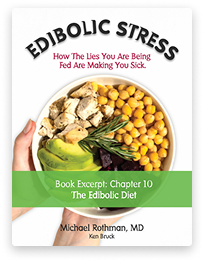The Edibolic Diet
Have you grown frustrated by diets that never seem to work? Have you lost weight only to gain it all back after a few months? Do you suffer pain or unexplained symptoms that are interfering with your life? If you’re nodding your head, it’s time to look into the benefits of a fundamental diet that includes a daily food plan and recommended daily food intake. The Edibolic Diet developed by Dr. Michael Rothman at Michael Rothman MD will put you on a path to wellness to help you maintain a healthy weight.
Recommended Daily Food Intake
Did you know that certain foods can cause chronic degenerative diseases? The edible choices you make every day affect more than your weight – they affect your health. While most nutritional counseling dieticians dwell on calories, carbohydrates, fats and restrictions, Michael Rothman MD offers a fundamental diet with healthy food plans for women and men that will help you achieve the best health of your life.
Daily Food Plan
- Eat 3 meals each day. Each meal should include a serving of meat, fish, poultry, eggs, or cheese.
- Limit your intake of sugar, including fruit.
- Avoid juice and other sweetened beverages.
- Avoid consuming polyunsaturated vegetable oils (these are found in salad dressings, mayonnaise, and margarine) and foods cooked in these oils.
- Avoid mistakes.
Note: This is NOT a high-protein diet. The goal of the diet is to spread out the intake of dietary protein (and fat) throughout the day in order to achieve better blood sugar control. (see “The importance of maintaining glycemic control”)
The amount of dietary protein per day/meal is based on your optimal body weight.
If you weigh 105 lbs – 7 ounces of protein/day= 2.3 ounces of protein/meal
If you weigh 120 lbs – 8 ounces of protein/day= 2.7 ounces of protein/meal
If you weigh 135 lbs – 9 ounces of protein/day= 3.0 ounces of protein/meal
If you weigh 150 lbs – 10 ounces of protein/day= 3.3 ounces of protein/meal
If you weigh 165 lbs – 11 ounces of protein/day= 3.7 ounces of protein/meal
If you weigh 180 lbs – 12 ounces of protein/day= 4.0 ounces of protein/meal
If you weigh 195 lbs – 13 ounces of protein/day= 4.3 ounces of protein/meal
If you weigh 225 lbs – 15 ounces of protein/day= 5.0 ounces of protein/meal

Start your journey to true well-being:
For each ounce of protein (and fat) consumed, you should eat about 10 grams of carbohydrates (see “how to find the correct protein/carbohydrate balance below”).
If you weigh 105 lbs – 70 grams of carbs/day= 23 grams of carbs/meal
If you weigh 120 lbs – 80 grams of carbs/day= 27 grams of carbs/meal
If you weigh 135 lbs – 90 grams of carbs/day= 30 grams of carbs/meal
If you weigh 150 lbs – 100 grams of carbs/day= 33 grams of carbs/meal
If you weigh 165 lbs – 110 grams of carbs/day= 37 grams of carbs/meal
If you weigh 180 lbs – 120 grams of carbs/day= 40 grams of carbs/meal
If you weigh 195 lbs – 130 grams of carbs/day= 43 grams of carbs/meal
If you weigh 210 lbs – 140 grams of carbs/day= 47 grams of carbs/meal
If you weigh 225 lbs – 150 grams of carbs/day= 50 grams of carbs/meal
Note: This diet is the starting point for the patient who has not had his/her metabolic imbalances identified. Once your metabolic imbalances are identified, the diet will be further modified.
How to Find the Correct Protein/Carbohydrate Balance
For the average person, one ounce of dietary protein/fat should be balanced with 10 grams of carbohydrates (those wishing to lose weight and/or specific metabolic types will modify this ratio somewhat)
Let’s get clear on the following parameters:
One pound of meat (or fish, poultry, or cheese) = 16 ounces
½ pound = 8 ounces
1/3 pound = 5 1/3 ounces
¼ pound = 4 ounces
1/6 pound = 2.7 ounces
1/8 pound = 2 ounces
So whatever the protein/fat source is go by how much it weighs.
Ready to Take Control of Your Health?
If you’re ready to prioritize your health and are seeking effective, metabolically directed treatments, contact us online or call (732) 268-7663 for a consultation with Dr. Rothman.
Note: a large egg is about 1½ ounces.
The number of grams of carbohydrates will either be listed on the package or (if the item isn’t labeled) use a carbohydrate counter (carbohydrate-guide.com is a good web-based carb counter). You’ve also been given a simplified carbohydrate list in your diet instructions. Each point is equivalent to one gram of carbohydrates.
Here are a few examples of some balanced meals for your daily food plan:
- A quarter pound of chicken = 4 ounces of chicken and one cup of pasta = about 40 grams of carbohydrates. Add to this an unlimited amount of spinach lightly cooked in olive oil.
- Two eggs = 3 ounces of protein and two slices of toast = about 30 grams of carbohydrates (note that if you drink juice with this meal, you will exceed the desired protein/carbohydrate ratio. If you want the juice, then you have to skip the toast.).
- You go to the deli and get a ¼ pound (4 ounces) of turkey breast. If you eat ½ the package, that would be 2 ounces of meat. If you put this on a very small hard roll (about 20 grams of carbohydrates) you have a balanced snack. Add lettuce and tomatoes in unlimited quantities.
Following this daily food plan and recommended daily food intake is a great first step toward achieving health and wellness. By choosing these metabolically directed foods reduce your food cravings, help you achieve optimal weight, improve your sleep and maximize your energy.
You can learn more about this fundamental diet with healthy food plans for women and men by buying Dr. Michael Rothman’s book now. Click Here to Buy Book Now. For even better results, make an appointment today for holistic nutritional counseling guidance to put you on a path to better health.













